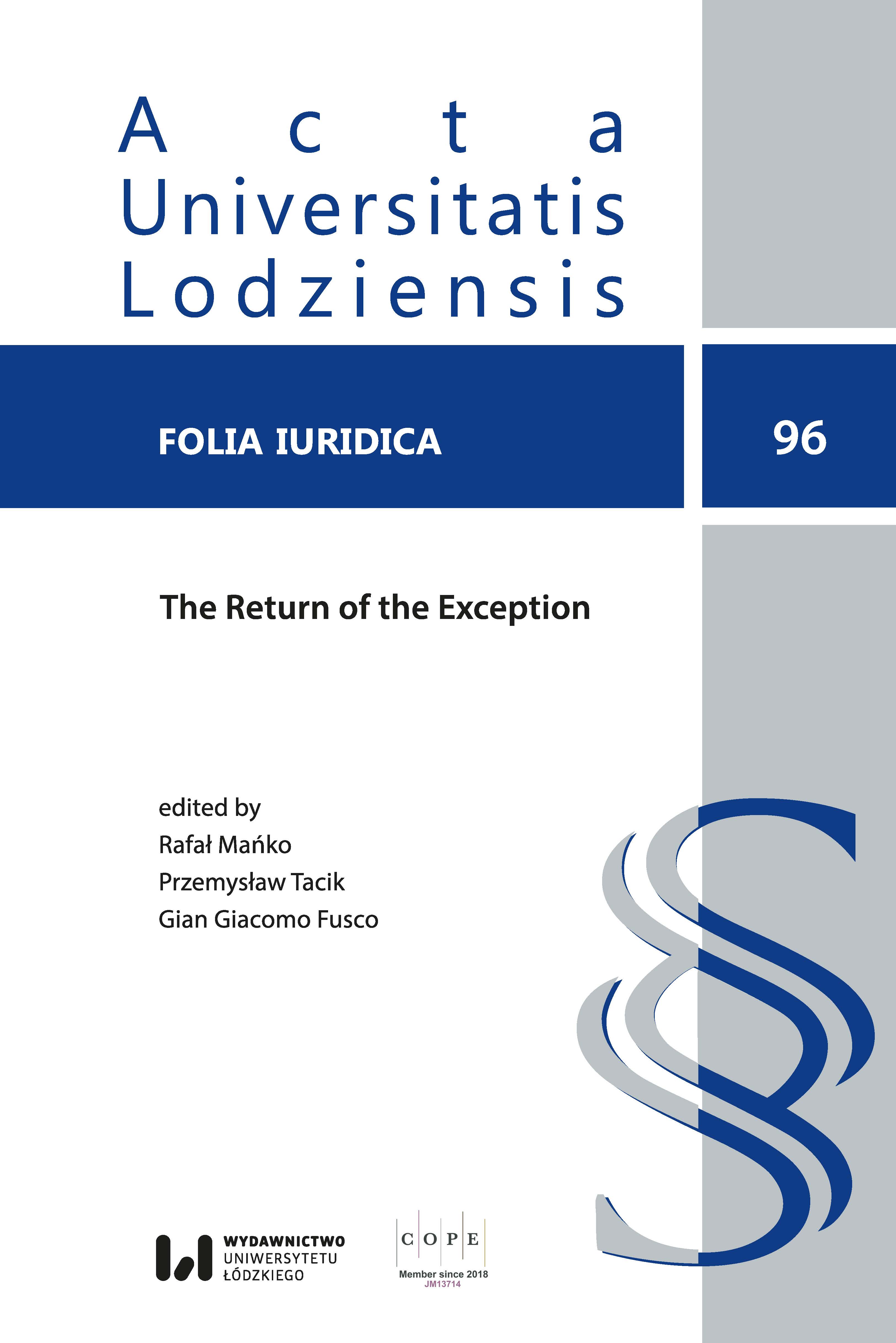Lockdown: komentarz
DOI:
https://doi.org/10.18778/0208-6069.96.05Słowa kluczowe:
lockdown, COVID-19, pandemia, stan wyjątkowy, bezpieczeństwoAbstrakt
Słownik Collinsa wybrał lockdown jako swoje słowo roku 2020. Zdefiniowane jako „nałożenie surowych ograniczeń na podróże, interakcje społeczne i dostęp do przestrzeni publicznej”, o których zadecydowały rządy „w celu złagodzenia rozprzestrzeniania się COVID-19”; dla leksykografów Collinsa lockdown zajął pierwsze miejsce, ponieważ jest to jednoczące doświadczenie dla miliardów ludzi na całym świecie, którzy musieli wspólnie odegrać swoją rolę w walce z rozprzestrzenianiem się wirusa. W obliczu nieznanego, zupełnie nowego wirusa, rządy na całym świecie zareagowały w dość znany sposób, zawieszając normalny tok życia społecznego poprzez wdrożenie środków, które zwykle zalicza się do stanu wyjątkowego. Niniejszy artykuł jest komentarzem, który ma na celu umieszczenie praktyki lockdownu (jako rządowego środka administracyjnego) w kontekście teorii państwa i rządu. W zakresie, w jakim sytuacje nadzwyczajne są zawsze odkrywcze, artykuł ten będzie argumentował, że stan wyjątkowy – którego podkategorią jest zamknięcie – w eksponowaniu suwerennej władzy państwa obnaża radykalną niemoc, w której jest ugruntowany i z której bierze swoje ostateczne znaczenie i funkcję.
Pobrania
Bibliografia
Agamben, Giorgio. 2001. “Security and Terror.” Theory & Event 5(4). https://doi.org/10.1353/tae.2001.0030
Google Scholar
DOI: https://doi.org/10.1353/tae.2001.0030
Agamben, Giorgio. 2020. A che punto siamo? L’Epidemia come politica. Macerata: Quodlibet.
Google Scholar
Agamben, Giorgio. 2020a. “Stato di Eccezione e Stato di Emergenza.” Quodlibet, July 30, 2020. https://www.quodlibet.it/giorgio-agamben-stato-di-eccezione-e-stato-di-emergenza [Accessed: 17 June 2021].
Google Scholar
Agamben, Giorgio. 2020b. “Due vocaboli infami.” Quodlibet, July 10, 2020. https://www.quodlibet.it/giorgio-agamben-due-vocaboli-infami [Accessed: 17 June 2021].
Google Scholar
Beck, Ulrich. 1992. The risk society. Towards a new modernity. London: Sage.
Google Scholar
Coccia, Emanuele. 2020. “Reversing the New Global Monasticism.” Semester, April 21, 2020. https://fallsemester.org/2020–1/2020/4/17/emanuele-coccia-escaping-the-global-monasticism [Accessed: 15 February 2021].
Google Scholar
D’Abramo, Flavio. Giulia Gandolfi. Gerardo Ienna. Pietro Daniel Omodeo. Charles Wolfe. 2021. “Political Epistemology of Pandemic Management.” MeFiSto. Medicina Filosofia Storia.
Google Scholar
De Cesare, Donatella. 2020. Virus sovrano? L’Asfissia capitalistica. Torino: Bollati Boringhieri.
Google Scholar
Foucault, Michel. 1998. The History of Sexuality. Vol. 1: An Introduction. Translated by R Hurley. New York: Penguin.
Google Scholar
Foucault, Michel. 2003. Abnormal: Lectures at the Collège de France, 1974–1975. Translated by Graham Burchell. New York: Picador.
Google Scholar
Foucault, Michel. 2009. Security, Territory, Population: Lectures at the Collège De France, 1977–1978. Translated by Graham Burchell. Basingstoke: Palgrave Macmillan.
Google Scholar
Fusco, Gian Giacomo. 2020. “Exception, Fiction, Performativity.” In States of Exception: Law, History, Theory. 15–33. Edited by Gian Giacomo Fusco, Cosmin Cercel, Simon Lavis. Abingdon–New York: Routledge. https://doi.org/10.4324/9780429022296-1
Google Scholar
DOI: https://doi.org/10.4324/9780429022296-1
Hamilton, Alexander. 2008. The Federalist Papers. Oxford: Oxford University Press.
Google Scholar
Hobbes, Thomas. 1998. Leviathan. Edited by J.C.A. Gaskin. Oxford: Oxford University Press.
Google Scholar
Hunt Botting, Eileen. 2020. “A novel (coronavirus) reading of Hobbes’s Leviathan.” History of European Ideas. 47(1): 33–37. https://doi.org/10.1080/01916599.2020.1792059
Google Scholar
DOI: https://doi.org/10.1080/01916599.2020.1792059
Iacob, Anisia. 2020. “The Question of Technology and Media in the Current Pandemic.” Saeculum 50(2): 11–18.
Google Scholar
Kant, Immanuel. 2006. Anthropology from a Pragmatic Point of View. Translated by Robert B. Louden. Cambridge: Cambridge University Press.
Google Scholar
Kierkegaard, Søren. 1983. Fear and Trembling: Repetition. Translated by Howard V. Hong. Princeton: Princeton University Press.
Google Scholar
Lamola, M. John. 2020. “Thomas Hobbes in the Time of Coronavirus.” Social Epistemology Review and Reply Collective 9(4): 72–75.
Google Scholar
Luhmann, Niklas. 1993. Risk: A Sociological Theory. Berlin: Walter de Gruyter.
Google Scholar
Ojakangas, Mika. 2012. “Potentia absoluta et potentia ordinata Dei: on the theological origins of Carl Schmitt’s theory of constitution.” Continental Philosophy Review 45: 505–517. https://doi.org/10.1007/s11007-012-9233-x
Google Scholar
DOI: https://doi.org/10.1007/s11007-012-9233-x
Randi, Eugenio. 1987. Il Sovrano e l’Orologiaio. Due immagini di Dio nel dibattito sulla «Potentia absoluta» fra XIII e XIV secolo di Eugenio Randi. Firenze: La Nuova Italia.
Google Scholar
Roeser, Sabine. Rafaela Hillerbrand. Per Sandin. Martin Peterson. Eds. 2012. Handbook of Risk Theory Epistemology, Decision Theory, Ethics, and Social Implications of Risk. Dordrecht: Springer. https://doi.org/10.1007/978-94-007-1433-5
Google Scholar
DOI: https://doi.org/10.1007/978-94-007-1433-5
Santi, Raffaella. 2020. “Politics and Salus Populi: Hobbes and the Sovereign as Physician of the State.” Philosophy Study 10(11): 693–702. https://doi.org/10.17265/2159-5313/2020.11.003
Google Scholar
DOI: https://doi.org/10.17265/2159-5313/2020.11.003
Schmitt, Carl. 2005. Political Theology. Four Chapter on the Concept of Sovereignty. Translated by George Schwab. Chicago: The University of Chicago Press. https://doi.org/10.7208/chicago/9780226738901.001.0001
Google Scholar
DOI: https://doi.org/10.7208/chicago/9780226738901.001.0001
Traversino Di Cristo, Massimiliano. 2018. “The Classic Age of the Distinction between God’s Absolute and Ordered Power.” Franciscan Studies 76(1): 207–266. https://doi.org/10.1353/frc.2018.0007
Google Scholar
DOI: https://doi.org/10.1353/frc.2018.0007
Tushnet, Mark. 1996. “Defending the Indeterminacy Thesis.” Quinnipiac Law Review 16: 339–356.
Google Scholar
Ventura, Raffaele Alberto. 2020. Radical Choc. Ascesa e caduta dei competenti. Torino: Einaudi.
Google Scholar
Zagrebelsky, Gustavo. 2020. Il Mondo dopo la fine del Mondo. Roma–Bari: Laterza.
Google Scholar
Basic Law for the Federal Republic of Germany. https://www.btg-bestellservice.de/pdf/80201000.pdf [Accessed: 17 June 2021].
Google Scholar
Italian Constitution. https://www.senato.it/documenti/repository/istituzione/costituzione_inglese.pdf [Accessed: 17 June 2021].
Google Scholar
Spanish Constitution. https://www.boe.es/legislacion/documentos/ConstitucionINGLES.pdf [Accessed: 17 June 2021].
Google Scholar
Pobrania
Opublikowane
Jak cytować
Numer
Dział
Licencja

Utwór dostępny jest na licencji Creative Commons Uznanie autorstwa – Użycie niekomercyjne – Bez utworów zależnych 4.0 Międzynarodowe.














